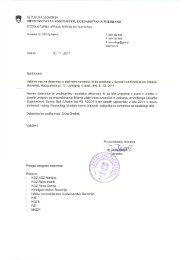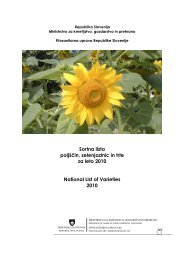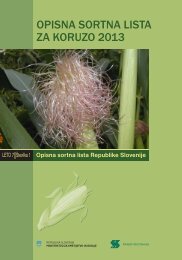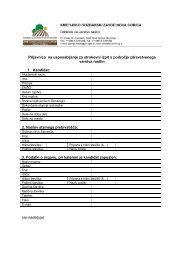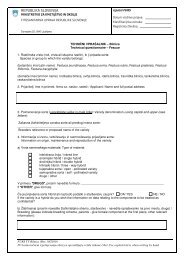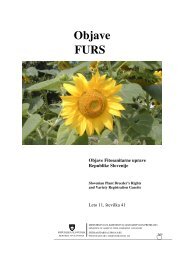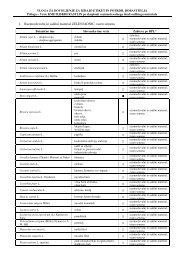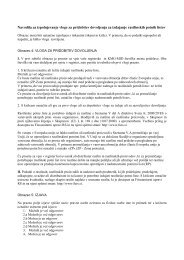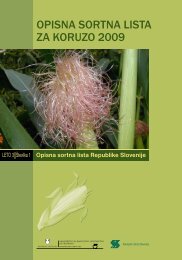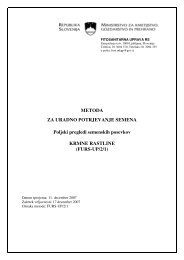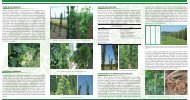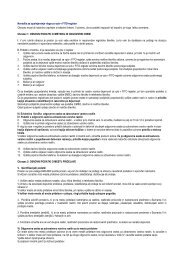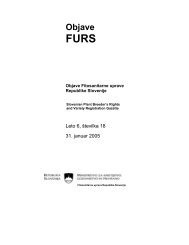spremenjene - Fitosanitarna uprava RS
spremenjene - Fitosanitarna uprava RS
spremenjene - Fitosanitarna uprava RS
You also want an ePaper? Increase the reach of your titles
YUMPU automatically turns print PDFs into web optimized ePapers that Google loves.
84 Uradni list <strong>RS</strong> 84/2000 z dne 22. 9. 2000<br />
113. Zakon o ratifikaciji Konvencije o varstvu rastlin (<strong>spremenjene</strong>) (MKV<strong>RS</strong>), stran 1193.<br />
Na podlagi druge alinee prvega odstavka 107. člena in prvega odstavka 91. člena Ustave<br />
Republike Slovenije izdajam<br />
U K A Z<br />
O RAZGLASITVI ZAKONA O RATIFIKACIJI KONVENCIJE O VA<strong>RS</strong>TVU<br />
RASTLIN (SPREMENJENE) (MKV<strong>RS</strong>)<br />
Razglašam Zakon o ratifikaciji Koncenvije o varstvu rastlin (<strong>spremenjene</strong>) (MKV<strong>RS</strong>), ki ga je<br />
sprejel Državni zbor Republike Slovenije na seji 29. avgusta 2000.<br />
Št. 001-22-165/00<br />
Ljubljana, dne 6. septembra 2000<br />
Predsednik<br />
Republike Slovenije<br />
Milan Kučan l. r.<br />
Z A K O N<br />
O RATIFIKACIJI KONVENCIJE O VA<strong>RS</strong>TVU RASTLIN (<strong>spremenjene</strong>) (MKV<strong>RS</strong>)<br />
1. člen<br />
Ratificira se Konvencija o varstvu rastlin (spremenjena), sprejeta 17. novembra 1997 v Rimu.<br />
2. člen<br />
Konvencija se v izvirniku v angleškem jeziku in v prevodu v slovenskem jeziku glasi:<br />
INTERNATIONAL PLANT PROTECTION CONVENTION<br />
(New Revised Text approved by the FAO Conference at its 29th Session – November<br />
1997)<br />
The contracting parties,<br />
PREAMBLE
– recognizing the necessity for international cooperation in controlling pests of plants and<br />
plant products and in preventing their international spread, and especially their introduction<br />
into endangered areas;<br />
– recognizing that phytosanitary measures should be technically justified, transparent and<br />
should not be applied in such a way as to constitute either a means of arbitrary or unjustified<br />
discrimination or a disguised restriction, particularly on international trade;<br />
– desiring to ensure close coordination of measures directed to these ends;<br />
– desiring to provide a framework for the development and application of harmonized<br />
phytosanitary measures and the elaboration of international standards to that effect;<br />
– taking into account internationally approved principles governing the protection of plant,<br />
human and animal health, and the environment; and<br />
– noting the agreements concluded as a result of the Uruguay Round of Multilateral Trade<br />
Negotiations, including the Agreement on the Application of Sanitary and Phytosanitary<br />
Measures;<br />
have agreed as follows:<br />
Purpose and responsibility<br />
ARTICLE I<br />
1. With the purpose of securing common and effective action to prevent the spread and<br />
introduction of pests of plants and plant products, and to promote appropriate measures for<br />
their control, the contracting parties undertake to adopt the legislative, technical and<br />
administrative measures specified in this Convention and in supplementary agreements<br />
pursuant to Article XVI.<br />
2. Each contracting party shall assume responsibility, without prejudice to obligations<br />
assumed under other international agreements, for the fulfilment within its territories of all<br />
requirements under this Convention.<br />
3. The division of responsibilities for the fulfilment of the requirements of this Convention<br />
between member organizations of FAO and their member states that are contracting parties<br />
shall be in accordance with their respective competencies.<br />
4. Where appropriate, the provisions of this Convention may be deemed by contracting<br />
parties to extend, in addition to plants and plant products, to storage places, packaging,<br />
conveyances, containers, soil and any other organism, object or material capable of<br />
harbouring or spreading plant pests, particularly where international transportation is<br />
involved.<br />
Use of terms<br />
ARTICLE II<br />
1. For the purpose of this Convention, the following terms shall have the meanings hereunder<br />
assigned to them:<br />
“Area of low pest prevalence” – an area, whether all of a country, part of a country, or all or<br />
parts of several countries, as identified by the competent authorities, in which a specific pest<br />
occurs at low levels and which is subject to effective surveillance, control or eradication<br />
measures;<br />
“Commission” – the Commission on Phytosanitary Measures established under Article XI;
“Endangered area” – an area where ecological factors favour the establishment of a pest<br />
whose presence in the area will result in economically important loss;<br />
“Establishment” – perpetuation, for the foreseeable future, of a pest within an area after entry;<br />
“Harmonized phytosanitary measures” – phytosanitary measures established by contracting<br />
parties based on international standards;<br />
“International standards” – international standards established in accordance with Article X,<br />
paragraphs 1 and 2;<br />
“Introduction” – the entry of a pest resulting in its establishment;<br />
“Pest” – any species, strain or biotype of plant, animal or pathogenic agent injurious to plants<br />
or plant products;<br />
“Pest risk analysis” – the process of evaluating biological or other scientific and economic<br />
evidence to determine whether a pest should be regulated and the strength of any<br />
phytosanitary measures to be taken against it;<br />
“Phytosanitary measure” – any legislation, regulation or official procedure having the purpose<br />
to prevent the introduction and/or spread of pests;<br />
“Plant products” – unmanufactured material of plant origin (including grain) and those<br />
manufactured products that, by their nature or that of their processing, may create a risk for<br />
the introduction and spread of pests;<br />
“Plants” – living plants and parts thereof, including seeds and germplasm;<br />
“Quarantine pest” – a pest of potential economic importance to the area endangered thereby<br />
and not yet present there, or present but not widely distributed and being officially controlled;<br />
“Regional standards” – standards established by a regional plant protection organization for<br />
the guidance of the members of that organization;<br />
“Regulated article” – any plant, plant product, storage place, packaging, conveyance,<br />
container, soil and any other organism, object or material capable of harbouring or spreading<br />
pests, deemed to require phytosanitary measures, particularly where international<br />
transportation is involved;<br />
“Regulated non-quarantine pest” – a non-quarantine pest whose presence in plants for<br />
planting affects the intended use of those plants with an economically unacceptable impact<br />
and which is therefore regulated within the territory of the importing contracting party;<br />
“Regulated pest” – a quarantine pest or a regulated non-quarantine pest;<br />
“Secretary” – Secretary of the Commission appointed pursuant to Article XII;
“Technically justified” – justified on the basis of conclusions reached by using an appropriate<br />
pest risk analysis or, where applicable, another comparable examination and evaluation of<br />
available scientific information.<br />
2. The definitions set forth in this Article, being limited to the application of this Convention,<br />
shall not be deemed to affect definitions established under domestic laws or regulations of<br />
contracting parties.<br />
ARTICLE III<br />
Relationship with other international agreements<br />
Nothing in this Convention shall affect the rights and obligations of the contracting parties<br />
under relevant international agreements.<br />
ARTICLE IV<br />
General provisions relating to the organizational arrangements for national plant protection<br />
1. Each contracting party shall make provision, to the best of its ability, for an official national<br />
plant protection organization with the main responsibilities set out in this Article.<br />
2. The responsibilities of an official national plant protection organization shall include the<br />
following:<br />
a) the issuance of certificates relating to the phytosanitary regulations of the importing<br />
contracting party for consignments of plants, plant products and other regulated articles;<br />
b) the surveillance of growing plants, including both areas under cultivation (inter alia<br />
fields, plantations, nurseries, gardens, greenhouses and laboratories) and wild flora, and of<br />
plants and plant products in storage or in transportation, particularly with the object of<br />
reporting the occurrence, outbreak and spread of pests, and of controlling those pests,<br />
including the reporting referred to under Article VIII paragraph 1(a);<br />
c) the inspection of consignments of plants and plant products moving in international<br />
traffic and, where appropriate, the inspection of other regulated articles, particularly with the<br />
object of preventing the introduction and/or spread of pests;<br />
d) the disinfestation or disinfection of consignments of plants, plant products and other<br />
regulated articles moving in international traffic, to meet phytosanitary requirements;<br />
e) the protection of endangered areas and the designation, maintenance and surveillance of<br />
pest free areas and areas of low pest prevalence;<br />
f) the conduct of pest risk analyses;<br />
g) to ensure through appropriate procedures that the phytosanitary security of consignments<br />
after certification regarding composition, substitution and reinfestation is maintained prior to<br />
export; and<br />
h) training and development of staff.<br />
3. Each contracting party shall make provision, to the best of its ability, for the following:<br />
a) the distribution of information within the territory of the contracting party regarding<br />
regulated pests and the means of their prevention and control;<br />
b) research and investigation in the field of plant protection;<br />
c) the issuance of phytosanitary regulations; and<br />
d) the performance of such other functions as may be required for the implementation of<br />
this Convention.
4. Each contracting party shall submit a description of its official national plant protection<br />
organization and of changes in such organization to the Secretary. A contracting party shall<br />
provide a description of its organizational arrangements for plant protection to another<br />
contracting party, upon request.<br />
Phytosanitary certification<br />
ARTICLE V<br />
1. Each contracting party shall make arrangements for phytosanitary certification, with the<br />
objective of ensuring that exported plants, plant products and other regulated articles and<br />
consignments thereof are in conformity with the certifying statement to be made pursuant to<br />
paragraph 2(b) of this Article.<br />
2. Each contracting party shall make arrangements for the issuance of phytosanitary<br />
certificates in conformity with the following provisions:<br />
a) Inspection and other related activities leading to issuance of phytosanitary certificates<br />
shall be carried out only by or under the authority of the official national plant protection<br />
organization. The issuance of phytosanitary certificates shall be carried out by public officers<br />
who are technically qualified and duly authorized by the official national plant protection<br />
organization to act on its behalf and under its control with such knowledge and information<br />
available to those officers that the authorities of importing contracting parties may accept the<br />
phytosanitary certificates with confidence as dependable documents.<br />
b) Phytosanitary certificates, or their electronic equivalent where accepted by the importing<br />
contracting party concerned, shall be as worded in the models set out in the Annex to this<br />
Convention. These certificates should be completed and issued taking into account relevant<br />
international standards.<br />
c) Uncertified alterations or erasures shall invalidate the certificates.<br />
3. Each contracting party undertakes not to require consignments of plants or plant products<br />
or other regulated articles imported into its territories to be accompanied by phytosanitary<br />
certificates inconsistent with the models set out in the Annex to this Convention. Any<br />
requirements for additional declarations shall be limited to those technically justified.<br />
Regulated pests<br />
ARTICLE VI<br />
1. Contracting parties may require phytosanitary measures for quarantine pests and regulated<br />
non-quarantine pests, provided that such measures are:<br />
(a) no more stringent than measures applied to the same pests, if present within the territory<br />
of the importing contracting party; and<br />
(b) limited to what is necessary to protect plant health and/or safeguard the intended use<br />
and can be technically justified by the contracting party concerned.<br />
2. Contracting parties shall not require phytosanitary measures for non-regulated pests.<br />
Requirements in relation to imports<br />
ARTICLE VII<br />
1. With the aim of preventing the introduction and/or spread of regulated pests into their<br />
territories, contracting parties shall have sovereign authority to regulate, in accordance with
applicable international agreements, the entry of plants and plant products and other regulated<br />
articles and, to this end, may:<br />
a) prescribe and adopt phytosanitary measures concerning the importation of plants, plant<br />
products and other regulated articles, including, for example, inspection, prohibition on<br />
importation, and treatment;<br />
b) refuse entry or detain, or require treatment, destruction or removal from the territory of<br />
the contracting party, of plants, plant products and other regulated articles or consignments<br />
thereof that do not comply with the phytosanitary measures prescribed or adopted under<br />
subparagraph (a);<br />
c) prohibit or restrict the movement of regulated pests into their territories;<br />
d) prohibit or restrict the movement of biological control agents and other organisms of<br />
phytosanitary concern claimed to be beneficial into their territories.<br />
2. In order to minimize interference with international trade, each contracting party, in<br />
exercising its authority under paragraph 1 of this Article, undertakes to act in conformity with<br />
the following:<br />
a) Contracting parties shall not, under their phytosanitary legislation, take any of the<br />
measures specified in paragraph 1 of this Article unless such measures are made necessary by<br />
phytosanitary considerations and are technically justified.<br />
b) Contracting parties shall, immediately upon their adoption, publish and transmit<br />
phytosanitary requirements, restrictions and prohibitions to any contracting party or parties<br />
that they believe may be directly affected by such measures.<br />
c) Contracting parties shall, on request, make available to any contracting party the<br />
rationale for phytosanitary requirements, restrictions and prohibitions.<br />
d) If a contracting party requires consignments of particular plants or plant products to be<br />
imported only through specified points of entry, such points shall be so selected as not to<br />
unnecessarily impede international trade. The contracting party shall publish a list of such<br />
points of entry and communicate it to the Secretary, any regional plant protection organization<br />
of which the contracting party is a member, all contracting parties which the contracting party<br />
believes to be directly affected, and other contracting parties upon request. Such restrictions<br />
on points of entry shall not be made unless the plants, plant products or other regulated<br />
articles concerned are required to be accompanied by phytosanitary certificates or to be<br />
submitted to inspection or treatment.<br />
e) Any inspection or other phytosanitary procedure required by the plant protection<br />
organization of a contracting party for a consignment of plants, plant products or other<br />
regulated articles offered for importation, shall take place as promptly as possible with due<br />
regard to their perishability.<br />
f) Importing contracting parties shall, as soon as possible, inform the exporting contracting<br />
party concerned or, where appropriate, the re-exporting contracting party concerned, of<br />
significant instances of non-compliance with phytosanitary certification. The exporting<br />
contracting party or, where appropriate, the re-exporting contracting party concerned, should<br />
investigate and, on request, report the result of its investigation to the importing contracting<br />
party concerned.<br />
g) Contracting parties shall institute only phytosanitary measures that are technically<br />
justified, consistent with the pest risk involved and represent the least restrictive measures<br />
available, and result in the minimum impediment to the international movement of people,<br />
commodities and conveyances.<br />
h) Contracting parties shall, as conditions change, and as new facts become available,<br />
ensure that phytosanitary measures are promptly modified or removed if found to be<br />
unnecessary.
i) Contracting parties shall, to the best of their ability, establish and update lists of regulated<br />
pests, using scientific names, and make such lists available to the Secretary, to regional plant<br />
protection organizations of which they are members and, on request, to other contracting<br />
parties.<br />
j) Contracting parties shall, to the best of their ability, conduct surveillance for pests and<br />
develop and maintain adequate information on pest status in order to support categorization of<br />
pests, and for the development of appropriate phytosanitary measures. This information shall<br />
be made available to contracting parties, on request.<br />
3. A contracting party may apply measures specified in this Article to pests which may not<br />
be capable of establishment in its territories but, if they gained entry, cause economic damage.<br />
Measures taken against these pests must be technically justified.<br />
4. Contracting parties may apply measures specified in this Article to consignments in<br />
transit through their territories only where such measures are technically justified and<br />
necessary to prevent the introduction and/or spread of pests.<br />
5. Nothing in this Article shall prevent importing contracting parties from making special<br />
provision, subject to adequate safeguards, for the importation, for the purpose of scientific<br />
research, education, or other specific use, of plants and plant products and other regulated<br />
articles, and of plant pests.<br />
6. Nothing in this Article shall prevent any contracting party from taking appropriate<br />
emergency action on the detection of a pest posing a potential threat to its territories or the<br />
report of such a detection. Any such action shall be evaluated as soon as possible to ensure<br />
that its continuance is justified. The action taken shall be immediately reported to contracting<br />
parties concerned, the Secretary, and any regional plant protection organization of which the<br />
contracting party is a member.<br />
International cooperation<br />
ARTICLE VIII<br />
1. The contracting parties shall cooperate with one another to the fullest practicable extent in<br />
achieving the aims of this Convention, and shall in particular:<br />
a) cooperate in the exchange of information on plant pests, particularly the reporting of the<br />
occurrence, outbreak or spread of pests that may be of immediate or potential danger, in<br />
accordance with such procedures as may be established by the Commission;<br />
b) participate, in so far as is practicable, in any special campaigns for combatting pests that<br />
may seriously threaten crop production and need international action to meet the emergencies;<br />
and<br />
c) cooperate, to the extent practicable, in providing technical and biological information<br />
necessary for pest risk analysis.<br />
2. Each contracting party shall designate a contact point for the exchange of information<br />
connected with the implementation of this Convention.<br />
Regional plant protection organizations<br />
ARTICLE IX<br />
1. The contracting parties undertake to cooperate with one another in establishing regional<br />
plant protection organizations in appropriate areas.
2. The regional plant protection organizations shall function as the coordinating bodies in<br />
the areas covered, shall participate in various activities to achieve the objectives of this<br />
Convention and, where appropriate, shall gather and disseminate information.<br />
3. The regional plant protection organizations shall cooperate with the Secretary in<br />
achieving the objectives of the Convention and, where appropriate, cooperate with the<br />
Secretary and the Commission in developing international standards.<br />
4. The Secretary will convene regular Technical Consultations of representatives of<br />
regional plant protection organizations to:<br />
a) promote the development and use of relevant international standards for phytosanitary<br />
measures; and<br />
b) encourage inter-regional cooperation in promoting harmonized phytosanitary measures<br />
for controlling pests and in preventing their spread and/or introduction.<br />
Standards<br />
ARTICLE X<br />
1. The contracting parties agree to cooperate in the development of international standards in<br />
accordance with the procedures adopted by the Commission.<br />
2. International standards shall be adopted by the Commission.<br />
3. Regional standards should be consistent with the principles of this Convention; such<br />
standards may be deposited with the Commission for consideration as candidates for<br />
international standards for phytosanitary measures if more broadly applicable.<br />
4. Contracting parties should take into account, as appropriate, international standards when<br />
undertaking activities related to this Convention.<br />
Commission on Phytosanitary Measures<br />
ARTICLE XI<br />
1. Contracting parties agree to establish the Commission on Phytosanitary Measures within<br />
the framework of the Food and Agriculture Organization of the United Nations (FAO).<br />
2. The functions of the Commission shall be to promote the full implementation of the<br />
objectives of the Convention and, in particular, to:<br />
a) review the state of plant protection in the world and the need for action to control the<br />
international spread of pests and their introduction into endangered areas;<br />
b) establish and keep under review the necessary institutional arrangements and procedures<br />
for the development and adoption of international standards, and to adopt international<br />
standards;<br />
c) establish rules and procedures for the resolution of disputes in accordance with Article<br />
XIII;<br />
d) establish such subsidiary bodies of the Commission as may be necessary for the proper<br />
implementation of its functions;<br />
e) adopt guidelines regarding the recognition of regional plant protection organizations;<br />
f) establish cooperation with other relevant international organizations on matters covered<br />
by this Convention;<br />
g) adopt such recommendations for the implementation of the Convention as necessary;<br />
and<br />
h) perform such other functions as may be necessary to the fulfilment of the objectives of<br />
this Convention.
3. Membership in the Commission shall be open to all contracting parties.<br />
4. Each contracting party may be represented at sessions of the Commission by a single<br />
delegate who may be accompanied by an alternate, and by experts and advisers. Alternates,<br />
experts and advisers may take part in the proceedings of the Commission but may not vote,<br />
except in the case of an alternate who is duly authorized to substitute for the delegate.<br />
5. The contracting parties shall make every effort to reach agreement on all matters by<br />
consensus. If all efforts to reach consensus have been exhausted and no agreement is reached,<br />
the decision shall, as a last resort, be taken by a two-thirds majority of the contracting parties<br />
present and voting.<br />
6. A member organization of FAO that is a contracting party and the member states of that<br />
member organization that are contracting parties shall exercise their membership rights and<br />
fulfil their membership obligations in accordance, mutatis mutandis, with the Constitution and<br />
General Rules of FAO.<br />
7. The Commission may adopt and amend, as required, its own Rules of Procedure, which<br />
shall not be inconsistent with this Convention or with the Constitution of FAO.<br />
8. The Chairperson of the Commission shall convene an annual regular session of the<br />
Commission.<br />
9. Special sessions of the Commission shall be convened by the Chairperson of the<br />
Commission at the request of at least one-third of its members.<br />
10. The Commission shall elect its Chairperson and no more than two Vice-Chairpersons,<br />
each of whom shall serve for a term of two years.<br />
Secretariat<br />
ARTICLE XII<br />
1. The Secretary of the Commission shall be appointed by the Director-General of FAO.<br />
2. The Secretary shall be assisted by such secretariat staff as may be required.<br />
3. The Secretary shall be responsible for implementing the policies and activities of the<br />
Commission and carrying out such other functions as may be assigned to the Secretary by this<br />
Convention and shall report thereon to the Commission.<br />
4. The Secretary shall disseminate:<br />
a) international standards to all contracting parties within sixty days of adoption;<br />
b) to all contracting parties, lists of points of entry under Article VII paragraph 2(d)<br />
communicated by contracting parties;<br />
c)lists of regulated pests whose entry is prohibited or referred to in Article VII paragraph<br />
2(i) to all contracting parties and regional plant protection organizations;<br />
d) information received from contracting parties on phytosanitary requirements, restrictions<br />
and prohibitions referred to in Article VII paragraph 2(b), and descriptions of official national<br />
plant protection organizations referred to in Article IV paragraph 4.<br />
5. The Secretary shall provide translations in the official languages of FAO of<br />
documentation for meetings of the Commission and international standards.<br />
6. The Secretary shall cooperate with regional plant protection organizations in achieving<br />
the aims of the Convention.<br />
Settlement of disputes<br />
ARTICLE XIII
1. If there is any dispute regarding the interpretation or application of this Convention, or if a<br />
contracting party considers that any action by another contracting party is in conflict with the<br />
obligations of the latter under Articles V and VII of this Convention, especially regarding the<br />
basis of prohibiting or restricting the imports of plants, plant products or other regulated<br />
articles coming from its territories, the contracting parties concerned shall consult among<br />
themselves as soon as possible with a view to resolving the dispute.<br />
2. If the dispute cannot be resolved by the means referred to in paragraph 1, the contracting<br />
party or parties concerned may request the Director-General of FAO to appoint a committee<br />
of experts to consider the question in dispute, in accordance with rules and procedures that<br />
may be established by the Commission.<br />
3. This Committee shall include representatives designated by each contracting party<br />
concerned. The Committee shall consider the question in dispute, taking into account all<br />
documents and other forms of evidence submitted by the contracting parties concerned. The<br />
Committee shall prepare a report on the technical aspects of the dispute for the purpose of<br />
seeking its resolution. The preparation of the report and its approval shall be according to<br />
rules and procedures established by the Commission, and it shall be transmitted by the<br />
Director-General to the contracting parties concerned. The report may also be submitted, upon<br />
its request, to the competent body of the international organization responsible for resolving<br />
trade disputes.<br />
4. The contracting parties agree that the recommendations of such a committee, while not<br />
binding in character, will become the basis for renewed consideration by the contracting<br />
parties concerned of the matter out of which the disagreement arose.<br />
5. The contracting parties concerned shall share the expenses of the experts.<br />
6. The provisions of this Article shall be complementary to and not in derogation of the<br />
dispute settlement procedures provided for in other international agreements dealing with<br />
trade matters.<br />
Substitution of prior agreements<br />
ARTICLE XIV<br />
This Convention shall terminate and replace, between contracting parties, the International<br />
Convention respecting measures to be taken against the Phylloxera vastatrix of 3 November<br />
1881, the additional Convention signed at Berne on 15 April 1889 and the International<br />
Convention for the Protection of Plants signed at Rome on 16 April 1929.<br />
Territorial application<br />
ARTICLE XV<br />
1. Any contracting party may at the time of ratification or adherence or at any time thereafter<br />
communicate to the Director-General of FAO a declaration that this Convention shall extend<br />
to all or any of the territories for the international relations of which it is responsible, and this<br />
Convention shall be applicable to all territories specified in the declaration as from the<br />
thirtieth day after the receipt of the declaration by the Director-General.<br />
2. Any contracting party which has communicated to the Director-General of FAO a<br />
declaration in accordance with paragraph 1 of this Article may at any time communicate a<br />
further declaration modifying the scope of any former declaration or terminating the<br />
application of the provisions of the present Convention in respect of any territory. Such
modification or termination shall take effect as from the thirtieth day after the receipt of the<br />
declaration by the Director-General.<br />
3. The Director-General of FAO shall inform all contracting parties of any declaration<br />
received under this Article.<br />
Supplementary agreements<br />
ARTICLE XVI<br />
1. The contracting parties may, for the purpose of meeting special problems of plant<br />
protection which need particular attention or action, enter into supplementary agreements.<br />
Such agreements may be applicable to specific regions, to specific pests, to specific plants and<br />
plant products, to specific methods of international transportation of plants and plant products,<br />
or otherwise supplement the provisions of this Convention.<br />
2. Any such supplementary agreements shall come into force for each contracting party<br />
concerned after acceptance in accordance with the provisions of the supplementary<br />
agreements concerned.<br />
3. Supplementary agreements shall promote the intent of this Convention and shall conform<br />
to the principles and provisions of this Convention, as well as to the principles of<br />
transparency, non-discrimination and the avoidance of disguised restrictions, particularly on<br />
international trade.<br />
Ratification and adherence<br />
ARTICLE XVII<br />
1. This Convention shall be open for signature by all states until 1 May 1952 and shall be<br />
ratified at the earliest possible date. The instruments of ratification shall be deposited with the<br />
Director-General of FAO, who shall give notice of the date of deposit to each of the signatory<br />
states.<br />
2. As soon as this Convention has come into force in accordance with Article XXII it shall<br />
be open for adherence by non-signatory states and member organizations of FAO. Adherence<br />
shall be effected by the deposit of an instrument of adherence with the Director-General of<br />
FAO, who shall notify all contracting parties.<br />
3. When a member organization of FAO becomes a contracting party to this Convention,<br />
the member organization shall, in accordance with the provisions of Article II paragraph 7 of<br />
the FAO Constitution, as appropriate, notify at the time of its adherence such modifications or<br />
clarifications to its declaration of competence submitted under Article II paragraph 5 of the<br />
FAO Constitution as may be necessary in light of its acceptance of this Convention. Any<br />
contracting party to this Convention may, at any time, request a member organization of FAO<br />
that is a contracting party to this Convention to provide information as to which, as between<br />
the member organization and its member states, is responsible for the implementation of any<br />
particular matter covered by this Convention. The member organization shall provide this<br />
information within a reasonable time.<br />
Non-contracting parties<br />
ARTICLE XVIII
The contracting parties shall encourage any state or member organization of FAO, not a party<br />
to this Convention, to accept this Convention, and shall encourage any non-contracting party<br />
to apply phytosanitary measures consistent with the provisions of this Convention and any<br />
international standards adopted hereunder.<br />
Languages<br />
ARTICLE XIX<br />
1. The authentic languages of this Convention shall be all official languages of FAO.<br />
2. Nothing in this Convention shall be construed as requiring contracting parties to provide<br />
and to publish documents or to provide copies of them other than in the language(s) of the<br />
contracting party, except as stated in paragraph 3 below.<br />
3. The following documents shall be in at least one of the official languages of FAO:<br />
a) information provided according to Article IV paragraph 4;<br />
b) cover notes giving bibliographical data on documents transmitted according to Article<br />
VII paragraph 2(b);<br />
c) information provided according to Article VII paragraph 2(b), (d), (i) and (j);<br />
d) notes giving bibliographical data and a short summary of relevant documents on<br />
information provided according to Article VIII paragraph 1(a);<br />
e) requests for information from contact points as well as replies to such requests, but not<br />
including any attached documents;<br />
f) any document made available by contracting parties for meetings of the Commission.<br />
Technical assistance<br />
ARTICLE XX<br />
The contracting parties agree to promote the provision of technical assistance to contracting<br />
parties, especially those that are developing contracting parties, either bilaterally or through<br />
the appropriate international organizations, with the objective of facilitating the<br />
implementation of this Convention.<br />
Amendment<br />
ARTICLE XXI<br />
1. Any proposal by a contracting party for the amendment of this Convention shall be<br />
communicated to the Director-General of FAO.<br />
2. Any proposed amendment of this Convention received by the Director-General of FAO<br />
from a contracting party shall be presented to a regular or special session of the Commission<br />
for approval and, if the amendment involves important technical changes or imposes<br />
additional obligations on the contracting parties, it shall be considered by an advisory<br />
committee of specialists convened by FAO prior to the Commission.<br />
3. Notice of any proposed amendment of this Convention, other than amendments to the<br />
Annex, shall be transmitted to the contracting parties by the Director-General of FAO not<br />
later than the time when the agenda of the session of the Commission at which the matter is to<br />
be considered is dispatched.<br />
4. Any such proposed amendment of this Convention shall require the approval of the<br />
Commission and shall come into force as from the thirtieth day after acceptance by two-thirds
of the contracting parties. For the purpose of this Article, an instrument deposited by a<br />
member organization of FAO shall not be counted as additional to those deposited by member<br />
states of such an organization.<br />
5. Amendments involving new obligations for contracting parties, however, shall come into<br />
force in respect of each contracting party only on acceptance by it and as from the thirtieth<br />
day after such acceptance. The instruments of acceptance of amendments involving new<br />
obligations shall be deposited with the Director-General of FAO, who shall inform all<br />
contracting parties of the receipt of acceptance and the entry into force of amendments.<br />
6. Proposals for amendments to the model phytosanitary certificates set out in the Annex to<br />
this Convention shall be sent to the Secretary and shall be considered for approval by the<br />
Commission. Approved amendments to the model phytosanitary certificates set out in the<br />
Annex to this Convention shall become effective ninety days after their notification to the<br />
contracting parties by the Secretary.<br />
7. For a period of not more than twelve months from an amendment to the model<br />
phytosanitary certificates set out in the Annex to this Convention becoming effective, the<br />
previous version of the phytosanitary certificates shall also be legally valid for the purpose of<br />
this Convention.<br />
Entry into force<br />
ARTICLE XXII<br />
As soon as this Convention has been ratified by three signatory states it shall come into force<br />
among them. It shall come into force for each state or member organization of FAO ratifying<br />
or adhering thereafter from the date of deposit of its instrument of ratification or adherence.<br />
Denunciation<br />
ARTICLE XXIII<br />
1. Any contracting party may at any time give notice of denunciation of this Convention by<br />
notification addressed to the Director-General of FAO. The Director-General shall at once<br />
inform all contracting parties.<br />
2. Denunciation shall take effect one year from the date of receipt of the notification by the<br />
Director-General of FAO.<br />
Annex: Model Phytosanitary Certificate
MEDNARODNA KONVENCIJA O VA<strong>RS</strong>TVU RASTLIN<br />
(Novo, popravljeno besedilo, potrjeno na 29. zasedanju konference FAO – november<br />
1997)<br />
UVOD<br />
Pogodbenice se<br />
– ob spoznanju, da je pri zatiranju rastlinam in rastlinskim proizvodom škodljivih<br />
organizmov ter pri preprečevanju njihovega mednarodnega širjenja, zlasti pa njihovega<br />
vnašanja na ogrožena območja, nujno mednarodno sodelovanje;<br />
– ob spoznanju, da morajo biti fitosanitarni ukrepi strokovno upravičeni in pregledni ter da<br />
jih ne bi smeli uporabljati za samovoljno ali neupravičeno diskriminacijo ali prikrito<br />
omejevanje, zlasti v mednarodni trgovini;<br />
– v želji, da bi v ta namen zagotovili tesno usklajevanje ukrepov;<br />
– v želji, da se s tem namenom vzpostavi mreža za pripravo in uporabo usklajenih<br />
fitosanitarnih ukrepov in za oblikovanje mednarodnih standardov;<br />
– ob upoštevanju mednarodno potrjenih načel, ki veljajo za zdravstveno varstvo rastlin,<br />
ljudi in živali ter za varstvo okolja;<br />
– ob upoštevanju sporazumov, ki so bili sklenjeni na podlagi urugvajskega kroga<br />
večstranskih trgovinskih pogajanj, vključno s Sporazumom o uporabi sanitarnih in<br />
fitosanitarnih ukrepov<br />
dogovorijo o naslednjem:<br />
I. ČLEN<br />
Namen in obveznosti<br />
1. Da bi zagotovile skupne in učinkovite ukrepe za preprečevanje širjenja in vnašanja<br />
rastlinam in rastlinskim proizvodom škodljivih organizmov ter uveljavljale ustrezne ukrepe za<br />
njihovo zatiranje, se pogodbenice obvezujejo, da bodo sprejele zakonodajne, tehnične in<br />
upravne ukrepe, navedene v tej konvenciji in v dodatnih sporazumih v skladu s XVI. členom.<br />
2. Pogodbenica se zavezuje, da bo na svojem ozemlju izpolnjevala vse zahteve iz te<br />
konvencije, ne da bi to kakor koli vplivalo na izpolnjevanje obveznosti, ki jih je prevzela z<br />
drugimi mednarodnimi sporazumi.<br />
3. Porazdelitev odgovornosti za izpolnjevanje zahtev iz te konvencije med organizacijami,<br />
članicami FAO, ter njihovimi državami članicami, ki so pogodbenice, je skladna z njihovimi<br />
pristojnostmi.<br />
4. Če se jim zdi potrebno, lahko pogodbenice veljavnost določb te konvencije z rastlin in<br />
rastlinskih proizvodov razširijo tudi na skladiščne prostore, embalažo, prevozna sredstva,<br />
zabojnike, zemljo in katere koli druge organizme, predmete ali snovi, ki lahko vsebujejo ali<br />
širijo rastlinam škodljive organizme, zlasti, ko gre za mednarodni prevoz.<br />
II. ČLEN<br />
Pomen izrazov<br />
1. V tej konvenciji izrazi, navedeni v tem členu, pomenijo:<br />
»Območje majhne razširjenosti škodljivih organizmov« – Območje celotne države, dela<br />
države oziroma več držav ali njihovih delov, na katerem se po ugotovitvah pristojnih organov
določeni škodljivi organizem pojavlja v majhnem številu in nad katerim se izvaja učinkovit<br />
stalni nadzor ter ukrepi za zatiranje ali izkoreninjenje.<br />
»Komisija« – Komisija za fitosanitarne ukrepe, ustanovljena v skladu z XI. členom.<br />
»Ogroženo območje« – Območje, na katerem so ekološki dejavniki ugodni za naselitev<br />
škodljivega organizma, katerega navzočnost bo v tem območju povzročila pomembno<br />
gospodarsko škodo.<br />
»Naselitev« – Ustalitev škodljivega organizma v predvidenem obdobju znotraj območja po<br />
vstopu.<br />
»Usklajeni fitosanitarni ukrepi« – fitosanitarni ukrepi, ki jih pogodbenice sprejmejo na<br />
podlagi mednarodnih standardov.<br />
»Mednarodni standardi « – mednarodni standardi, določeni v skladu s prvim in drugim<br />
odstavkom X. člena.<br />
»Vnos« – Vstop škodljivega organizma, katerega posledica je njegova naselitev.<br />
»Škodljivi organizem« – Katera koli vrsta, različek, linija ali biotip rastline, živali ali<br />
povzročitelja, ki škoduje rastlinam ali rastlinskim proizvodom.<br />
»Analiza nevarnosti škodljivega organizma« – Postopek vrednotenja bioloških ali drugih<br />
znanstvenih in gospodarskih dokazov, na podlagi katerih se ugotovi, ali bi morali uvesti<br />
ukrepe za nadzor škodljivih organizmov in določi intenzivnost uporabljenih fitosanitarnih<br />
ukrepov.<br />
»Fitosanitarni ukrep« – Zakonodaja, predpis ali uradni postopek, katerega namen je<br />
preprečevati vnos oziroma širjenje škodljivih organizmov.<br />
»Rastlinski proizvodi« – Nepredelan material rastlinskega izvora (vključno z zrnjem) in<br />
tisti predelani proizvodi, ki lahko zaradi svojih lastnosti ali lastnosti postopkov, po katerih so<br />
bili predelani, pomenijo nevarnost vnosa in širjenja škodljivih organizmov.<br />
»Rastline« – Žive rastline in njihovi deli, vključno s semeni in klično dednino.<br />
»Karantenski škodljivi organizem« – Škodljivi organizem, ki lahko gospodarsko<br />
pomembno prizadene območje, ki ga ogroža, vendar tam še ni navzoč ali pa je navzoč, vendar<br />
še ni splošno razširjen in je pod uradnim nadzorom.<br />
»Regionalni standardi« – Standardi, s katerimi Regionalna organizacija za varstvo rastlin<br />
usmerja delovanje svojih članic.<br />
»Nadzorovani predmet« – Rastline, rastlinski proizvodi, skladiščni prostor, embalaža,<br />
prevozno sredstvo, zabojnik, zemlja ali kateri koli drugi organizem, predmet ali snov, ki lahko<br />
vsebuje ali širi škodljive organizme, in ki zahteva uvedbo fitosanitarnih ukrepov, zlasti ko gre<br />
za mednarodni prevoz.<br />
»Nadzorovani nekarantenski škodljivi organizem« – nekarantenski škodljivi organizem, ki<br />
ima ob okužbi rastlin za sajenje gospodarsko nesprejemljiv vpliv pri predvideni uporabi teh<br />
rastlin in je zato nadzorovan na ozemlju pogodbenice uvoznice.<br />
»Nadzorovani škodljivi organizem« – Karantenski škodljivi organizem ali nadzorovani<br />
nekarantenski škodljivi organizem.<br />
»Sekretar« – Sekretar Komisije, imenovan v skladu z XII. členom.<br />
»Strokovno upravičeno« – Presojeno na podlagi ugotovitev, ki izhajajo iz ustrezne analize<br />
nevarnosti škodljivega organizma ali, koder je primerno, iz druge primerljive proučitve in<br />
ovrednotenja razpoložljivih znanstvenih informacij.<br />
2. Opredelitve, ki so navedene v tem členu, so omejene na uporabo v tej konvenciji in ne<br />
vplivajo na opredelitve v domačih zakonih ali predpisih pogodbenic.<br />
III. ČLEN<br />
Razmerje do drugih mednarodnih Sporazumov
Ta konvencija v ničemer ne vpliva na pravice in obveznosti pogodbenic v skladu z drugimi<br />
mednarodnimi sporazumi.<br />
IV. ČLEN<br />
Splošne določbe glede organizacije varstva rastlin na državni ravni<br />
1. Pogodbenica po najboljših močeh poskrbi za ustanovitev uradne državne organizacije za<br />
varstvo rastlin, katere glavne odgovornosti so navedene v tem členu.<br />
2. Odgovornosti uradne državne organizacije za varstvo rastlin vključujejo:<br />
a) izdajanje spričeval, ki se nanašajo na fitosanitarne predpise pogodbenice uvoznice za<br />
pošiljke rastlin, rastlinskih proizvodov in drugih nadzorovanih predmetov.<br />
b) Stalni nadzor rastočih rastlin, vključno z obdelanimi površinami (med drugim sem<br />
spadajo polja, nasadi, drevesnice, vrtovi, rastlinjaki in laboratoriji), prostoživečimi rastlinami<br />
ter z rastlinami in rastlinskimi proizvodi v skladiščih ali med prevozom, predvsem s ciljem<br />
poročati o pojavu, izbruhu in širjenju škodljivih organizmov ter obvladovati te škodljive<br />
organizme, vključno s poročanjem iz točke a) prvega odstavka VIII. člena;<br />
c) Inšpekcijski pregled pošiljk rastlin in rastlinskih proizvodov v mednarodnem prometu ter<br />
kadar je potrebno, inšpekcijski pregled drugih nadzorovanih predmetov, zlasti da bi<br />
preprečevali vnos oziroma širjenje škodljivih organizmov;<br />
d) Dezinsekcijo ali dezinfekcijo pošiljk rastlin, rastlinskih proizvodov in drugih<br />
nadzorovanih predmetov v mednarodnem prometu, da se izpolnijo fitosanitarne zahteve;<br />
e) Varovanje ogroženih območij ter določanje, ohranjanje in stalni nadzor območij, na<br />
katerih ni škodljivih organizmov, in območij z majhno razširjenostjo škodljivih organizmov;<br />
f) Izvajanje analiz nevarnosti škodljivih organizmov;<br />
g) Zagotavljanje, da se po fitosanitarnem potrjevanju pošiljk pred izvozom z ustreznimi<br />
postopki ohrani njihova fitosanitarna neoporečnost glede sestave, zamenjave in ponovne<br />
naselitve škodljivih organizmov ter<br />
h) Usposabljanje in izpopolnjevanje osebja.<br />
3. Pogodbenica po najboljših močeh poskrbi za:<br />
a) Širjenje informacij na svojem ozemlju v zvezi z nadzorovanimi škodljivimi organizmi<br />
ter načini preprečevanja širjenja in zatiranja teh škodljivih organizmov,<br />
b) Raziskave in preiskave na področju varstva rastlin,<br />
c) Izdajanje fitosanitarnih predpisov in<br />
d) Izvajanje drugih dejavnosti, ki bi utegnile biti potrebne za uresničevanje te konvencije.<br />
4. Pogodbenica bo sekretarju predložila opis svoje državne organizacije za varstvo rastlin in<br />
morebitnih sprememb v tej organizaciji. Pogodbenica drugi pogodbenici na zahtevo priskrbi<br />
opis svojih organizacijskih dejavnosti na področju varstva rastlin.<br />
V. ČLEN<br />
Izdajanje fitosanitarnih spričeval<br />
1. Pogodbenica poskrbi za ustrezno fitosanitarno potrjevanje, s čimer želi zagotoviti, da<br />
izvožene rastline, rastlinski proizvodi in drugi nadzorovani predmeti in pošiljke ustrezajo<br />
navedbam v spričevalu, ki je izdano v skladu s točko b) drugega odstavka tega člena.<br />
2. Pogodbenica poskrbi za izdajanje fitosanitarnih spričeval v skladu z naslednjimi<br />
določbami:
a) Inšpekcijski pregled ali druge s tem povezane dejavnosti, potrebne za izdajanje<br />
fitosanitarnih spričeval, se izvajajo izključno v okviru uradne državne organizacije za varstvo<br />
rastlin. <strong>Fitosanitarna</strong> spričd) evala izdajajo državni uradniki, ki so strokovno usposobljeni in<br />
jih je državna organizacija za varstvo rastlin ustrezno pooblastila, da delujejo v njenem imenu<br />
in pod njenim nadzorom z znanjem in informacijami, ki jih imajo na voljo, da lahko organi<br />
pogodbenic uvoznic sprejmejo ta spričevala z zaupanjem kot verodostojne dokumente.<br />
b) <strong>Fitosanitarna</strong> spričevala ali njihove elektronske oblike, če jih zainteresirana pogodbenica<br />
uvoznica sprejme, bodo sestavljena skladno z vzorčnimi obrazci iz priloge k tej konvenciji. Ta<br />
spričevala morajo biti izpolnjena in izdana v skladu z ustreznimi mednarodnimi standardi.<br />
c) Če se vsebina spričeval neoverjeno spreminja ali briše, ta spričevala niso veljavna.<br />
3. Pogodbenica se zaveže, da ne bo zahtevala, da morajo biti pošiljke rastlin, rastlinskih<br />
proizvodov in drugih nadzorovanih predmetov, ki se uvažajo na njena ozemlja, opremljene s<br />
fitosanitarnimi spričevali, ki niso skladna z vzorčnimi obrazci iz priloge k tej konvenciji.<br />
Vsakršne zahteve po dodatnih izjavah morajo biti strokovno upravičene.<br />
VI. ČLEN<br />
Nadzorovani škodljivi organizmi<br />
1. Pogodbenice lahko zahtevajo uvedbo fitosanitarnih ukrepov za karantenske škodljive<br />
organizme in nadzorovane nekarantenske škodljive organizme, če:<br />
a) takšni ukrepi niso strožji od tistih, ki veljajo za iste škodljive organizme na ozemlju<br />
pogodbenice uvoznice,<br />
b) so omejeni na najnujnejše za zdravstveno varstvo rastlin oziroma zavarovanje<br />
predvidene uporabe in to lahko zainteresirana pogodbenica uvoznica strokovno upraviči.<br />
2. Pogodbenice ne zatevajo fitosanitarnih ukrepov za nenadzorovane škodljive organizme.<br />
VII. ČLEN<br />
Zahteve, povezane z uvozom<br />
1. Da bi preprečile vnašanje oziroma širjenje nadzorovanih škodljivih organizmov na svoja<br />
ozemlja, imajo pogodbenice pravico, da v skladu z veljavnimi mednarodnimi sporazumi po<br />
lastni presoji uravnavajo uvoz rastlin, rastlinskih proizvodov in drugih nadzorovanih<br />
predmetov, in lahko v ta namen:<br />
a) predpišejo in sprejmejo fitosanitarne ukrepe, ki se nanašajo na uvoz rastlin, rastlinskih<br />
proizvodov in drugih nadzorovanih predmetov, vključno na primer z inšpekcijskimi pregledi,<br />
prepovedjo uvoza in tretiranjem;<br />
b) zavrnejo uvoz rastlin, rastlinskih proizvodov oziroma drugih nadzorovanih predmetov ali<br />
njihovih pošiljk, ki ne ustrezajo fitosanitarnim ukrepom, predpisanim ali sprejetim v skladu s<br />
točko a), jih začasno zadržijo oziroma zahtevajo njihovo tretiranje, uničenje ali odstranitev s<br />
svojega ozemlja;<br />
c) prepovejo ali omejijo gibanje nadzorovanih škodljivih organizmov na svojem ozemlju;<br />
d) prepovejo ali omejijo gibanje organizmov za biotično zatiranje in drugih domnevno<br />
koristnih organizmov za fitosanitarno uporabo na njihovem ozemlju.<br />
2. Da bi čim manj ovirala mednarodno trgovino, se pogodbenica zaveže, da bo pri<br />
uveljavljanju svojih pravic iz prvega odstavka tega člena delovala v skladu z naslednjim:<br />
a) pogodbenice ne bodo na podlagi svoje fitosanitarne zakonodaje sprejele nobenega<br />
ukrepa iz prvega odstavka tega člena, razen če je tak ukrep nujen zaradi fitosanitarnih<br />
razlogov in je strokovno upravičen;
) pogodbenice bodo objavile fitosanitarne zahteve, omejitve in prepovedi takoj po<br />
njihovem sprejetju in o njih obvestile vse pogodbenice, za katere menijo, da bi jih takšni<br />
ukrepi utegnili neposredno prizadeti;<br />
c) pogodbenice bodo vsaki drugi pogodbenici na njeno zahtevo pojasnile razloge za<br />
fitosanitarne zahteve, omejitve in prepovedi;<br />
d) Če pogodbenica zahteva, da se pošiljke določenih rastlin ali rastlinskih proizvodov<br />
uvažajo le čez določena vstopna mesta, morajo biti ta mesta izbrana tako, da po nepotrebnem<br />
ne ovirajo mednarodne trgovine. Pogodbenica bo objavila seznam takšnih vstopnih mest in jih<br />
sporočila sekretarju, vsem regionalnim organizacijam za varstvo rastlin, katerih članica je,<br />
vsem pogodbenicam, za katere meni, da bi bile neposredno prizadete in drugim<br />
pogodbenicam na njihovo zahtevo. Takih omejitev glede vstopnih mest ne bo, če za rastline,<br />
rastlinske proizvode ali druge nadzorovane predmete ni potrebno fitosanitarno spričevalo<br />
oziroma jih ni treba inšpekcijsko pregledati ali tretirati.<br />
e) Inšpekcijski pregled ali drug fitosanitarni postopek, ki ga zahteva državna organizacija<br />
za varstvo rastlin pogodbenice za pošiljke rastlin, rastlinskih proizvodov ali drugih<br />
nadzorovanih predmetov, namenjenih uvozu, bo ob upoštevanju njihove pokvarljivosti<br />
opravljen čim prej.<br />
f) Pogodbenice uvoznice bodo čim prej obvestile ustrezno pogodbenico izvoznico, ali,<br />
koder je potrebno, ustrezno pogodbenico, ki ponovno izvaža, o pomembnejših neskladjih s<br />
fitosanitarnim spričevalom. Pogodbenica izvoznica, ali, koder je potrebno, pogodbenica, ki<br />
ponovno izvaža, mora opraviti preiskavo in prizadeti pogodbenici uvoznici na njeno zahtevo<br />
poročati o izsledkih preiskave.<br />
g) Pogodbenice bodo uvedle le fitosanitarne ukrepe, ki so strokovno upravičeni, ustrezajo<br />
nevarnosti škodljivih organizmov in čim manj omejujejo ter ovirajo mednarodni pretok ljudi,<br />
blaga in prevoznih sredstev.<br />
h) Če se bodo razmere spremenile in bodo na voljo nova spoznanja, bodo pogodbenice<br />
zagotovile, da bodo fitosanitarni ukrepi nemudoma spremenjeni ali odpravljeni, če bo<br />
ugotovljeno, da niso potrebni.<br />
i) Pogodbenice bodo po najboljših močaa) eh sestavile in dopolnjevale sezname<br />
nadzorovanih škodljivih organizmov, pri čemer bodo uporabljale latinska imena, te sezname<br />
pa bodo dale na voljo sekretarju, regionalnim organizacijam za varstvo rastlin, katerih članice<br />
so, in na zahtevo tudi drugim pogodbenicam.<br />
j) Pogodbenice bodo po najboljših močeh stalno nadzorovale škodljive organizme ter<br />
pridobivale in hranile ustrezne informacije o stanju škodljivih organizmov, da bi tako<br />
pomagale pri njihovi uvrstitvi ter pripomogle k oblikovanju ustreznih fitosanitarnih ukrepov.<br />
Pogodbenice bodo imele na zahtevo dostop do teh informacij.<br />
3. Pogodbenica lahko uvede ukrepe iz tega člena za škodljive organizme, ki morda niso<br />
sposobni naselitve na njenem ozemlju, vendar lahko, če jim uspe priti na to ozemlje,<br />
povzročijo gospodarsko škodo. Ukrepi proti tem škodljivim organizmom morajo biti<br />
strokovno upravičeni.<br />
4. Pogodbenice lahko ukrepe iz tega člena uvedejo za pošiljke v tranzitu čez njihova<br />
ozemlja le, če so takšni ukrepi strokovno upravičeni in potrebni za preprečevanje vnosa<br />
oziroma širjenja škodljivih organizmov.<br />
5. Ta člen v ničemer ne preprečuje pogodbenicam uvoznicam posebnega uvoza rastlin in<br />
rastlinskih proizvodov ter drugih nadzorovanih predmetov ter rastlinam škodljivih<br />
organizmov, ki se v skladu z ustreznimi varovalnimi ukrepi opravi za potrebe znanstvenih<br />
raziskav, izobraževanja ali v druge posebne namene.<br />
6. Ta člen v ničemer ne preprečuje pogodbenicam ustreznega varnostnega ukrepanja, če<br />
odkrije, da škodljivi organizem potencialno ogroža njihova ozemlja ali če so obveščene o<br />
takem odkritju. Tak ukrep bo čim prej ovrednoten, da se zagotovi upravičenost njegove
nadaljnje uporabe. O takih ukrepih morajo biti nemudoma obveščene prizadete pogodbenice,<br />
sekretar in regionalne organizacije za varstvo rastlin, katerih članica je pogodbenica.<br />
VIII. ČLEN<br />
Mednarodno sodelovanje<br />
1. Pogodbenice pri uresničevanju ciljev te konvencije sodelujejo med seboj v največjem<br />
možnem obsegu, zlasti pa:<br />
a) v skladu s postopki, ki jih lahko določi komisija, sodelujejo pri izmenjavi informacij o<br />
rastlinam škodljivih organizmih, zlasti pri poročanju o pojavu, izbruhu ali širjenju škodljivih<br />
organizmov, ki bi utegnili biti neposredno ali potencialno nevarni,<br />
b) sodelujejo, če je to izvedljivo, v vsaki posebni akciji za boj proti škodljivim<br />
organizmom, ki bi lahko resno ogrozili pridelek, če je za nujno rešitev problema potrebno<br />
mednarodno ukrepanje in<br />
c) po najboljših močeh sodelujejo pri zagotavljanju strokovnih in bioloških podatkov,<br />
potrebnih za analizo nevarnosti škodljivih organizmov.<br />
2. Pogodbenica določi kontaktno mesto za izmenjavo informacij, povezanih z izvajanjem te<br />
konvencije.<br />
IX. ČLEN<br />
Regionalne organizacije za varstvo rastlin<br />
1. Pogodbenice se zavežejo, da bodo med seboj sodelovale pri ustanavljanju regionalnih<br />
organizacij za varstvo rastlin na ustreznih območjih.<br />
2. Regionalne organizacije za varstvo rastlin delujejo kot koordinacijska telesa na<br />
območjih, ki jih pokrivajo, sodelujejo pri različnih aktivnostih za uresničevanje ciljev te<br />
konvencije in, kadar je to primerno, zbirajo in širijo informacije.<br />
3. Regionalne organizacije za varstvo rastlin sodelujejo s sekretarjem pri uresničevanju<br />
ciljev te konvencije in, kadar je primerno, s sekretarjem in komisijo pri oblikovanju<br />
mednarodnih standardov.<br />
4. Sekretar sklicuje redna strokovna posvetovanja s predstavniki regionalnih organizacij za<br />
varstvo rastlin, da bi:<br />
a) spodbujali oblikovanje in uporabo ustreznih mednarodnih standardov za fitosanitarne<br />
ukrepe in<br />
b) spodbujali medregionalno sodelovanje pri uveljavljanju usklajenih fitosanitarnih<br />
ukrepov za zatiranje škodljivih organizmov in pri preprečevanju njihovega širjenja oziroma<br />
vnašanja.<br />
X. ČLEN<br />
Standardi<br />
1. Pogodbenice soglašajo s sodelovanjem pri oblikovanju mednarodnih standardov v skladu s<br />
poslovnikom, ki ga sprejme komisija.<br />
2. Mednarodne standarde sprejema komisija.<br />
3. Regionalni standardi morajo biti skladni z načeli te konvencije; ti standardi so lahko<br />
predloženi komisiji, da jih prouči s stališča širše uporabnosti in jih morda sprejme kot<br />
mednarodne standarde za fitosanitarne ukrepe.
4. Pogodbenice bi morale pri izvajanju dejavnosti, povezanih s to konvencijo, upoštevati<br />
ustrezne mednarodne standarde.<br />
XI. ČLEN<br />
Komisija za fitosanitarne ukrepe<br />
1. Pogodbenice soglašajo, da bodo ustanovile komisijo za fitosanitarne ukrepe v okviru<br />
Organizacije Združenih narodov za prehrano in kmetijstvo (FAO).<br />
2. Naloga komisije je spodbujati celovito uresničevanje ciljev konvencije in predvsem:<br />
a) spremljati stanje varstva rastlin po svetu in ugotavljati potrebo po ukrepih za<br />
obvladovanje mednarodnega širjenja škodljivih organizmov ter njihovega vnašanja na<br />
ogrožena območja;<br />
b) uvesti in redno spremljati potrebne institucionalne programe in postopke za oblikovanje<br />
in sprejemanje mednarodnih standardov ter sprejemati mednarodne standarde;<br />
c) določiti pravila in postopke za reševanje sporov v skladu s XIII. členom;<br />
d) ustanoviti pomožna telesa komisije, ki bi utegnila biti potrebna za ustrezno opravljanje<br />
njenih nalog;<br />
e) sprejeti smernice v zvezi s priznavanjem regionalnih organizacij za varstvo rastlin;<br />
f) vzpostaviti sodelovanje z drugimi ustreznimi mednarodnimi organizacijami na področjih,<br />
ki jih obravnava ta konvencija;<br />
g) sprejeti potrebna priporočila za izvajanje te konvencije in<br />
h) izvajati druge naloge, ki bi utegnile biti potrebne za uresničevanje ciljev te konvencije.<br />
3. Vse pogodbenice imajo pravico do članstva v komisiji.<br />
4. Pogodbenico lahko na zasedanjih komisije zastopa en sam predstavnik, ki ga lahko<br />
spremljajo namestnik, strokovnjaki in svetovalci. Namestnik, strokovnjaki in svetovalci lahko<br />
sodelujejo pri delu komisije, ne morejo pa glasovati, razen, če je namestnik ustrezno<br />
pooblaščen za zastopanje predstavnika.<br />
5. Pogodbenice storijo vse, kar je v njihovi moči, da dosežejo soglasje o vseh zadevah. Če<br />
so vse možnosti za dosego soglasja izčrpane in dogovor še vedno ni dosežen, je odločitev, če<br />
ni druge možnosti, sprejeta z dvotretjinsko večino pogodbenic, ki so navzoče in glasujejo.<br />
6. Organizacija, članica FAO, ki je pogodbenica, in države, članice te organizacije, ki so<br />
pogodbenice, uveljavljajo svoje iz članstva izhajajoče pravice ter izpopolnjujejo svoje iz<br />
članstva izhajajoče obveznosti (mutatis mutandis) v skladu z ustavo in splošnimi pravili FAO.<br />
7. Komisija lahko sprejema in po potrebi dopolnjuje svoj poslovnik, ki pa mora biti skladen<br />
s to konvencijo ali z ustavo FAO.<br />
8. Predsednik komisije enkrat letno skliče redno letno zasedanje komisije.<br />
9. Predsednik komisije sklicuje izredna zasedanja komisije na zahtevo vsaj tretjine članic.<br />
10. Komisija izvoli predsednika in ne več kot dva podpredsednika, njihov mandat pa traja<br />
dve leti.<br />
XII. ČLEN<br />
Sekretariat<br />
1. Sekretarja komisije imenuje generalni direktor FAO.<br />
2. Sekretarju pomaga osebje sekretariata, če je to potrebno.<br />
3. Sekretar je odgovoren za izvajanje politike in dejavnosti komisije ter opravljanje drugih<br />
nalog, ki izhajajo iz te konvencije, in o tem poroča komisiji.<br />
4. Sekretar:
a) vse pogodbenice seznani z mednarodnimi standardi v šestdesetih dneh po njihovem<br />
sprejetju;<br />
b) vsem pogodbenicam pošlje sezname vstopnih mest iz točke d) drugega odstavka VII.<br />
člena, o katerih ga pogodbenice obvestijo;<br />
c) vsem pogodbenicam in regionalnim organizacijam za varstvo rastlin pošlje sezname<br />
nadzorovanih škodljivih organizmov, katerih vnos je prepovedan ali se nanje nanaša točka i)<br />
drugega odstavka VII. člena;<br />
d) pošlje informacije, ki jih prejme od pogodbenic glede fitosanitarnih zahtev, omejitev in<br />
prepovedi iz točke b) drugega odstavka VII. člena in opise uradnih državnih organizacij za<br />
varstvo rastlin iz četrtega odstavka IV. člena.<br />
5. Sekretar poskrbi, da so dokumentacija za zasedanja komisije in mednarodni standardi<br />
prevedeni v uradne jezike FAO.<br />
6. Sekretar sodeluje z regionalnimi organizacijami za varstvo rastlin pri uresničevanju<br />
ciljev te konvencije.<br />
XIII. ČLEN<br />
Reševanje sporov<br />
1. Če obstaja spor glede razlage ali uporabe te konvencije ali če pogodbenica meni, da je<br />
delovanje druge pogodbenice v nasprotju z njenimi obveznostmi iz V. in VII. člena te<br />
konvencije, zlasti glede osnove za prepoved ali omejitev uvoza rastlin, rastlinskih proizvodov<br />
ali drugih nadzorovanih predmetov, ki prihajajo z njenega ozemlja, se bodo v sporu udeležene<br />
pogodbenice med seboj čimprej posvetovale, da bi rešile ta spor.<br />
2. Če spora ni mogoče rešiti na način, opisan v prvem odstavku, lahko v sporu udeležena<br />
pogodbenica ali pogodbenice zahtevajo od generalnega direktorja FAO, da imenuje odbor<br />
strokovnjakov, ki naj prouči sporno zadevo v skladu s pravili in postopki, ki jih določi<br />
komisija.<br />
3. Člani tega odbora so predstavniki, ki jih imenuje vsaka v sporu udeležena pogodbenica.<br />
Komisija prouči sporno vprašanje, pri čemer upošteva vse listine in druge dokaze, ki jih<br />
predložijo v sporu udeležene pogodbenice. Odbor pripravi poročilo o strokovnih vidikih spora<br />
z namenom, da se spor razreši. Priprava poročila in njegova odobritev bosta potekala v skladu<br />
s pravili in postopki, ki jih določi komisija, generalni sekretar pa ga pošlje v sporu udeleženim<br />
pogodbenicam. Poročilo je lahko na zahtevo predloženo tudi pristojnemu organu mednarodne<br />
organizacije, ki je odgovoren za reševanje trgovinskih sporov.<br />
4. Pogodbenice soglašajo, da v sporu udeležene pogodbenice na podlagi priporočil odbora,<br />
čeprav po svoji naravi niso zavezujoča, ponovno proučijo zadevo, zaradi katere je prišlo do<br />
spora.<br />
5. V sporu udeležene pogodbenice si delijo stroške strokovnjakov.<br />
6. Določbe tega člena dopolnjujejo in ne nadomestijo postopkov za reševanje sporov,<br />
opredeljenih v drugih mednarodnih sporazumih, ki obravnavajo trgovinske zadeve.<br />
XIV. ČLEN<br />
Nadomestitev prejšnjih sporazumov<br />
S to konvencijo med pogodbenicami prenehajo veljati in se nadomestijo Mednarodna<br />
konvencija o ukrepih, ki jih je treba izvajati proti trtni uši Phylloxera vastatrix, podpisana 3.<br />
novembra 1881, dodatna konvencija, podpisana v Bernu, 15. aprila 1889, in Mednarodna<br />
konvencija o varstvu rastlin, podpisana v Rimu, 16. aprila 1929.
XV. ČLEN<br />
Ozemeljska veljavnost<br />
1. Pogodbenica lahko ob ratifikaciji ali pristopu ali kadar koli pozneje generalnemu direktorju<br />
FAO pošlje izjavo, da bo ta konvencija začela veljati za vsa ali nekatera ozemlja, za katere je<br />
odgovorna v mednarodnih odnosih; na vseh ozemljih, navedenih v izjavi, velja ta konvencija<br />
od tridesetega dne po tem, ko generalni direktor prejme tako izjavo.<br />
2. Pogodbenica, ki je generalnemu direktorju FAO poslala izjavo v skladu s prvim<br />
odstavkom tega člena, lahko kadar koli pošlje novo izjavo, s katero spremeni obseg vsake<br />
prejšnje izjave ali preneha uporabljati določbe te konvencije na katerem koli ozemlju. Taka<br />
sprememba ali prenehanje uporabe določb velja od tridesetega dne po tem, ko je o tem<br />
obveščen generalni direktor.<br />
3. Generalni direktor FAO vse pogodbenice obvesti o vseh izjavah, ki jih prejme v skladu s<br />
tem členom.<br />
XVI. ČLEN<br />
Dodatni sporazumi<br />
1. Pogodbenice lahko za reševanje posebnih vprašanj, povezanih z varstvom rastlin, ki<br />
potrebujejo posebno pozornost ali ukrepanje, sklepajo dodatne sporazume. Taki sporazumi se<br />
lahko uporabljajo za določene regije, za določene škodljive organizme, za določene rastline in<br />
rastlinske proizvode, za določene metode mednarodnega prevoza rastlin in rastlinskih<br />
proizvodov, ali pa lahko kako drugače nadomestijo določbe te konvencije.<br />
2. Vsi taki dodatni sporazumi začnejo veljati za zadevno pogodbenico, ko so sprejeti v<br />
skladu s svojimi določbami.<br />
3. Dodatni sporazumi naj spodbujajo uresničevanje ciljev te konvencije in bodo v skladu z<br />
načeli in določbami te konvencije, pa tudi z načeli preglednosti, nediskriminacije in<br />
izogibanja prikritim omejitvam, zlasti v mednarodni trgovini.<br />
XVII. ČLEN<br />
Ratifikacija in pristop<br />
1. Ta konvencija je na voljo za podpis vsem državam do 1. maja 1952 in bo čimprej<br />
ratificirana. Listine o ratifikaciji se deponirajo pri generalnem direktorju FAO, ki vsako<br />
državo podpisnico obvesti o datumu deponiranja.<br />
2. Takoj ko ta konvencija začne veljati v skladu z 22. členom, lahko k njej pristopijo tudi<br />
države, ki je niso podpisale in organizacije, članice FAO. Pristopijo z deponiranjem listine o<br />
pristopu pri generalnem direktorju FAO, ki o tem obvesti vse pogodbenice.<br />
3. Ko organizacija, članica FAO, postane pogodbenica te konvencije, ob svojem pristopu<br />
objavi v skladu z določbami sedmega odstavka II. člena ustave FAO spremembe ali pojasnila<br />
k izjavi o pristojnostih, predložene v skladu s petim odstavkom II. člena ustave FAO, kot je<br />
morda potrebno za sprejetje te konvencije. Pogodbenica lahko kadar koli zahteva od<br />
organizacije, članice FAO, ki je pogodbenica te konvencije, da ji priskrbi podatke o tem,<br />
katera od organizacij članic in njenih držav članic je odgovorna za izvajanje zadev, zajetih v<br />
tej konvenciji. Organizacija članica je dolžna te podatke priskrbeti v razumnem času.
XVIII. ČLEN<br />
Nepogodbenice<br />
Pogodbenice spodbujajo državo ali organizacijo članico FAO, ki ni pogodbenica te<br />
konvencije, naj sprejme konvencijo, spodbujajo pa tudi vsako nepogodbenico, naj uporablja<br />
fitosanitarne ukrepe, skladne z določbami te konvencije in mednarodnimi standardi,<br />
sprejetimi v skladu z njo.<br />
XIX. ČLEN<br />
Jeziki<br />
1. Enakoveljavni jeziki te konvencije so vsi uradni jeziki FAO.<br />
2. Dokumenti in kopije dokumentov, ki jih v skladu s to konvencijo priskrbijo ali objavijo<br />
pogodbenice, so lahko napisani v njenem jeziku (jezikih), razen v primerih, navedenih v<br />
tretjem odstavku spodaj.<br />
3. Naslednji dokumenti bodo napisani vsaj v enem uradnem jeziku FAO:<br />
a) informacije, poslane v skladu s četrtim odstavkom IV. člena,<br />
b) spremna besedila, ki vsebujejo bibliografske podatke o dokumentih, poslanih v skladu s<br />
točko b) drugega odstavka VII. člena,<br />
c) informacije poslane v skladu s točkami b), d), i) in j) drugega odstavka VII. člena,<br />
d) bibliografski podatki in kratki povzetki dokumentov, povezanih z informacijami,<br />
poslanimi v skladu s točko a) prvega odstavka VIII. člena,<br />
e) zahteve po informacijah s kontaktnih mest ter odgovori na takšne zahteve, razen<br />
priloženih dokumentov,<br />
f) dokumenti, ki jih dajo na voljo pogodbenice za zasedanja komisije.<br />
XX. ČLEN<br />
Strokovna pomoč<br />
Pogodbenice soglašajo, da se bodo za lažje izvajanje te konvencije zavzemale za<br />
zagotavljanje strokovne pomoči pogodbenicam, zlasti tistim v razvoju, in sicer dvostransko ali<br />
v ustreznih mednarodnih organizacijah.<br />
XXI. ČLEN<br />
Spremembe<br />
1. Pogodbenica pošlje predlog spremembe te konvencije generalnemu direktorju FAO.<br />
2. Predlagano spremembo te konvencije, ki jo od pogodbenice prejme generalni direktor<br />
FAO, ta predloži v odobritev komisiji na njenem rednem ali izrednem zasedanju, če pa gre pri<br />
dopolnjevanju za pomembne strokovne spremembe ali dodatne obveznosti pogodbenic, jih<br />
pred obravnavanjem komisije prouči svetovalni odbor strokovnjakov, ki ga skliče FAO.<br />
3. Obvestilo o vseh predlaganih spremembah te konvencije, ki se nanašajo na prilogo,<br />
pošlje generalni direktor FAO pogodbenicam najpozneje takrat, ko jim pošlje tudi dnevni red<br />
zasedanja komisije, na katerem naj bi razpravljali o zadevi.
4. Predlagano spremembo te konvencije mora odobriti komisija, velja pa od tridesetega dne<br />
po tem, ko jo sprejmeta dve tretjini pogodbenic. Za namen tega člena se listina, ki jo deponira<br />
organizacija, članica FAO, ne prišteje tistim, ki jih deponirajo države, članice te organizacije.<br />
5. Spremembe, ki pogodbenicam nalagajo nove obveznosti, veljajo za vsako pogodbenico<br />
le, če jih ta sprejme, in sicer od tridesetega dne po sprejetju. Listine o sprejetju sprememeb, ki<br />
pogodbenicam nalagajo nove obveznosti, se deponirajo pri generalnem direktorju FAO, ki vse<br />
pogodbenice obvesti o prejemu in začetku veljavnosti teh amandmajev.<br />
6. Predlogi sprememb k vzorčnim obrazcem fitosanitarnih spričeval iz priloge k tej<br />
konvenciji se pošljejo sekretarju, o njihovi odobritvi pa razpravlja komisija. Odobrene<br />
spremembe k vzorčnim obrazcem fitosanitarnih spričeval iz priloge k tej konvenciji začnejo<br />
veljati devetdeset dni po tem, ko sekretar uradno obvesti pogodbenice.<br />
7. Največ dvanajst mesecev po tem, ko začnejo veljati spremembe k vzorčnim obrazcem<br />
fitosanitarnih spričeval iz priloge k tej konvenciji, ostanejo za potrebe te konvencije pravno<br />
veljavne tudi prejšnje različice fitosanitarnih spričeval.<br />
XXII. ČLEN<br />
Začetek veljavnosti<br />
Takoj ko to konvencijo ratificirajo tri države podpisnice, začne med njimi veljati. Veljati<br />
začne tudi za vsako državo ali organizacijo članico FAO, ki jo ratificira ali k njej pristopi, in<br />
sicer od dneva deponiranja njene listiine o ratifikaciji ali pristopu.<br />
XXIII. ČLEN<br />
Odpoved<br />
1. Pogodbenica lahko kadar koli odpove ko konvencijo z uradnim obvestilom, in ga naslovi<br />
na generalnega direktorja FAO. Generalni direktor o tem nemudoma obvesti vse pogodbenice.<br />
2. Odpoved začne veljati leto dni po dnevu, o generalni direktor FAO o tem prejme uradno<br />
obvestilo.<br />
Priloga: Vzorčni obrazec fitosanitarnega spričevala<br />
3. člen<br />
Za izvajanje konvencije je pristojno Ministrstvo za kmetijstvo, gozdarstvo in prehrano.<br />
4. člen<br />
Ta zakon začne veljati naslednji dan po objavi v Uradnem listu Republike Slovenije –<br />
Mednarodne pogodbe.<br />
Št. 801-12/00-18/1<br />
Ljubljana, dne 29. avgusta 2000<br />
Predsednik<br />
Državnega zbora<br />
Republike Slovenije
Janez Podobnik, dr. med. l. r.<br />
Obiskovalce strani zavezuje naslednje pravno obvestilo.<br />
Spletno mesto poganja



